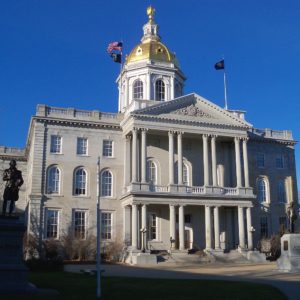CONCORD– Under the new Democratic majority, the New Hampshire House has given preliminary approval to nearly $310 million in tax and fee increases over the next four years, and more than half a billion dollars in new spending.
“Democrats are trying to unravel all of the positive work Republicans have done over the last two to four years on tax reductions and reforms, and responsible budgets and spending,” House Republican leader Dick Hinch (R-Merrimack) told NHJournal. “Republicans in the House have been united in voting against the absolutely crazy tax and fee increases, and the excessive number of appropriation bills.”
The full House voted to increase the state’s two largest business taxes, accounting for most of the increased tax revenue in Fiscal Years 2020-2023. But the House has also passed several other pieces of legislation that increase state revenues or expenditures. If all the bills given House approval were to be signed into law, taxes and fees would increase by $108 million in the next two years, and by $202 million in the following biennium, according to official estimates from the Legislative Budget Assistant’s Office (LBAO).
Other new revenues come from a tax on mutual funds to pay for a new state college savings program, an increase in OHRV and snowmobile fines, and more than doubling environment fees.
Spending would jump by $319 million in FY 20-21, and $246 million in FY 22-23. These figures do not capture the full increase in the state budget. In many cases, lawmakers have only appropriated funds for the first year or two on a new program, and the LBAO does not assume that spending in one budget will necessarily be carried over to the next.
In other instances, state departments are simply unable to estimate the cost of a proposed tax or spending increase. For example, the LBAO estimates that HB 712, the family and medical leave program pushed by Democrats at the State House, would cost nearly $25 million to administer over the next four years, but cannot determine how much the program would take from workers’ paychecks to pay for the additional leave mandates.
The Department of Revenue Administration says it does not know how much extending the state’s Interest and Dividends Tax to capital gains would raise under HB 686.
Regarding the proposed spending increases Speaker of the House Steve Shurtleff (D-Penacook) told NHJournal in a statement, “The House has not yet finished the budgeting process. When finished I trust the House will put forward a budget that is both fiscally responsible and works for all Granite Staters.”
Other spending initiatives to receive House approval include lifting the cap on the state’s Building Aid program, maintaining stabilization grants to municipalities scheduled to receive smaller state education grants, and $10 million for invasive species management.
The tax and spending bills are currently in the House Finance Committee, which will recommend whether to include them in the state’s two-year budget. Last month, Gov. Chris Sununu (R-Newfields) presented his budget proposal, a $13 billion spending plan without any tax or fee increases. Business taxes have been an especially contentious issue in Concord over the last three budget cycles, with Republicans pushing through a plan to ramp down the Business Enterprise Tax and Business Profits Tax in several stages, while Democrats have wanted to keep them where they are. HB 712 would reverse the latest drop in BET and BPT rates, and cancel the final reduction scheduled for January 2021.
The House Finance Committee must make its budget recommendation by Thursday, April 4, and the House needs to send its budget to the Senate by Thursday, April 11.

